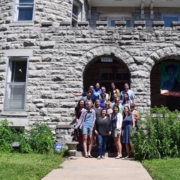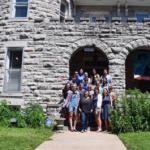Remember assistant principal Richard Vernon from The Breakfast Club? Who could forget his hostile approach to supervising adolescents during a Saturday detention! We would like to think his character is more caricature than realistic, but versions of Richard Vernon seem to haunt most schools, and of course, as a new teacher, you will want to avoid being sucked in by them.
Instead, find your tribe. Teaching can be as emotionally draining as it is fulfilling, and you will need your tribe to help you along the way.
I have been fortunate enough to find many, many people in my tribe over my teaching career. My very first department chair became my career mentor, and we still get together. When we do, we talk passionately about education, books, previous students we run into, and we still lose track of time.
One of my interdisciplinary teams became a strong support system for the day-to-day stresses. Anyone who needed to talk through an issue would email the group to email and ask to “meet on the square.” The carpet pattern created a blue square in a spot in the middle of a hallway, and we would stand in a tight circle on that square to listen, to support, and to offer suggestions if the person asked.
My district committed to long-term relationships with consultants, and two became mentors for me: Ruth Culham and Ellin Keene.
Ruth and I bonded over our love of YA literature and writing. We got to know each other waiting in a long line for the final Harry Potter book. What a night! My seventh grade daughter was with us, and she still talks about that night. Ruth used some of her experiences visiting my classroom in her book Traits of Writing: The Complete Guide for Middle School, which required monthly conversations and sharing of stories — such fun! She invited me to contribute to Using Benchmark Papers to Teach Writing with the Traits, which pushed me way out of my comfort zone and created my interest in sharing lesson ideas.
Ellin came to our district to help us grow as reading teachers and to guide our curriculum revision. We spent many long hours together on these tasks, and her quick wit and talent with students made every minute enjoyable. She worked with me and a team of teachers to develop an in-house lab system of professional development, which was the best PD model I experienced in my career. It remains a topic I am passionate about. She suggested many times that I write a book, and that’s a current goal.
Find mentors that push you to grow.
My main tribe consists of all the talented, intelligent ELA teachers I worked with through the years. Members of both my high school and middle ELA departments became friends both at school and in life, and they still fill my soul with joy over shared interests and passions. Some of them are pictured above.
How will you know if someone should be in your tribe?
This seems like an easy question, right? Most likely, you will be assigned a mentor. Other people who are nice, friendly, and welcoming will probably approach you. Teachers in your hall or who have the same lunch shift will definitely want to share stories with you. So how do you know whom to gravitate toward?
Pay close attention to the words people use when describing the students in their classroom. While all of us have students who try our patience or who frustrate us, we have many, many more students who delight and amaze us. Teachers who never seem to share their happy moments will probably make the job harder than it needs to be, so avoid spending your precious time listening to constant griping. According to Raj Raghunathan Ph.D., “Constant exposure to such negativity can make deep inroads into your bank of positivity, leading you to . . .become negative—diffident, anxious, and distrustful—yourself . . . .”
Look for teachers whose philosophies and pedagogy aligns at least somewhat with yours. While you are still growing your knowledge base, you have a sense of what feels right as you try different ideas. Be true to those feelings. I almost quit teaching in the first few years because I tried to teach exactly like another teacher, and it did not work for me. Students know when you are aligning your practice with your beliefs, and they will know when you are not!
Trust your gut. Unfortunately, many people feed off of dragging others down. Some teachers are so afraid of change that they attach themselves quickly to newcomers so they can ensure the new folks won’t initiate change. Many people equate change with loss, as Zachary Herrmann discusses in his blog post The Challenge of Change, so it’s not a surprise that this reaction is one you can find in most schools. Listen to your gut feelings about a person’s motives for befriending you. Those feelings will generally be correct!
Passion is contagious. Teaching is a career that is as much a calling as it is a skill, so you probably became a teacher because you felt passionate about education, literacy, children, etc. When you talk about what you love, don’t be afraid to let your passion show. We all get excited when we find others who love what we love, and that shared passion will forge a natural bond.
So find your tribe, and then nurture the people in your tribe. You will be able to withstand the pressures and stresses of teaching if you stand together in joy with other teachers.






